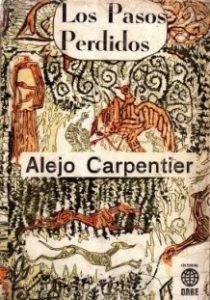The Lost Steps – Alejo Carpentier – 1953

Posted by guillermo maynez on 4/9/2013, 12:56:38
I finished this last night, and as I read I was thinking about what a pity it is that it took me so long to discover this writer, but what good fortune to be discovering him now. The story is simple yet surprising, strong, passionate. The unnamed character embodies the dreams many people in big cities have of running away from our grinding, stressing, often futile and humiliating civilization (and I’m an urban flower myself). I just spent half an hour choosing options on the phone just to ask a simple question about my credit card. After reading “The Lost Steps” I felt I had miserably wasted precious minutes of my life. But the other virtue of the book is that it does not romanticize life at the subsistence level. The main character takes it as it is, with no rosy pictures, fully aware of the trials implicit in close relationship with Nature, specifically in the very hostile environment of a tropical rainforest full, very full, of noxious and dangerous bugs. But perhaps, after growing up in the modern world, there’s no cure for us: we no longer belong in bare Nature, our psyches have been wired differently and we’ll never recover the lost Arcadia. Few people manage it.
As I was reading, too, I was reminded of Thomas Mann’s “Doktor Faustus”, and his craving to create the most accomplished musical work in history, a task akin to that imposed upon himself by the character with his “Treno” (I don’t know how it was translated into English). The moment when he discovers the birth of music in the jungle was truly sublime and beautifully chilling.
Just some initial thoughts on this book I enjoyed so much. I will be looking for other books by Carpentier soon,

Posted by Steven on 7/9/2013, 9:02:07, in reply to “The Lost Steps”
I enjoyed it very much as well and consider The Lost Steps the best book I’ve read so far this year. A couple of things I got from it…
Speaking of the Indians, the composer observes that “…not one gesture was made without cognizance of its meaning.” In our complex modern world so much of what we do is out of blind obedience to customs, manners, and patterns of behavior we follow without the slightest idea why we do so. Maybe the reasons are good; maybe they are silly, but is our indifference to the roots of our culture something that diminishes us as individuals and as a society?
And after his attempt to go back to the jungle and Rosario is a failure: “I told myself… that the discovery of new routes embarked upon without realization, without awareness of the wonder of it while it is being lived, is so unique, so defies recapture, that man, puffed up with his vanity, thinks he can repeat the feat whenever he wishes, master of a privilege denied to others.” But he who turns back and later seeks to recapture the miracle of discovery will find “the setting changed, the landmarks wiped out, and the faces of the guides new.”
Put simply, this is the old call for spontaneity and decisiveness: carpe diem. But it also says that even when we do make the best of something the first time, we can’t expect to repeat the same experience with the same results. You can’t recapture the magic of an experience just by following the same path a second time, because the sense of discovery is missing, and where the newness of something was once exciting, now you resent it. Better to leave that wonderful experience in your memories where it belongs and try something entirely new.
~
Posted by guillermo maynez on 18/9/2013, 13:16:25, in reply to “Re: The Lost Steps”
It is true that we mechanically repeat a lot of gestures, attitudes, and symbolic behavior without stopping for a second to think of what they mean. Our culture is full of empty remnants of previous rituals and ceremonies that were once full of meaning and deeply felt. Is that good or bad? I don’t know: on the one hand, a strict calendar of rituals has been a way in which elites have subjugated peoples from time immemorial, forcing them to spend dear resources on lavish religious festivities and blocking free thinking, going from feast to feast, always busy on those tasks that reinforce the domination of a group; on the other hand, those same festivities and rituals provided a sense of community and collective effort long gone from many modern communities.
Many of us non-religious people celebrate Christmas, for example, without any religious feeling, simply as that time of the year when families get together for superb food and drink, inside a cozy living room with dear ones (some of us have managed to restrain our Scrooge tendencies). The same is true for Holy Week in spring, an occasion for debauchery and beach vacation originally meant as a time of sorrow for the crucifixion of Our Savior. And so on…
I certainly empathized with “Lost Steps”‘s narrator, for there is much to hate about modern society and much to admire about primitive ones, but seriously, life in the jungle is much less than satisfying in a number of ways. He felt that when he was composing his masterpiece, feeling there was no point in it if he didn’t have the orchestra, musical instruments and audience to interpret and understand it.
What worked best for me was the way in which he came to experience the trip as a journey back in time, to primeval society, and the chapter where he is witness, there, live, to the birth of music, really gave me goosebumps, so lucid, deeply felt and shocking it is. A wonderful book, written in an elegant, baroque style that made me enjoy each word.